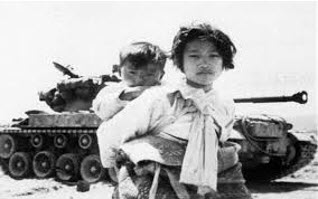The amount of international students entering Seoul National University (SNU) has increased over the past years. In relation to the increasing diversity in the university, the number of courses taught in English has risen. In the College of Engineering and the College of Business Administration, over 20% of courses taught are offered in English. In total, SNU offers over 12% of all courses in English. This articles reviews two popular English-taught courses that will be offered in the spring semester of 2015. The courses reviewed are ‘Two Koreas: Modern Korean History and Society’ and ‘Introduction to Psychology’.
Two Koreas: Modern Korean History and Society
Would the modernization of Korea still have been possible without prior Japanese colonization? Why did the Korean War break out? Why was Korea divided? Who or what is the main reason behind the continuous tensions in the Korean Peninsula?

Korean War (1950~1953)
This course aims to answer critical questions such as the ones listed above regarding Korea’s modern history. ‘Two Koreas’ is an exciting course because it demonstrates the various perspectives on modern Korean history. It requires students to think critically about the history of modern Korea, and a variety of related topics. Starting from the late Joseon period, the course covers issues like the economic growth and democratization of Korea throughout the decades. It will also explore the colonial period under Japanese rule, touching upon various theories as to why Korea was colonized.
The course will continue to the topic of the Korean War, with the division of the Korean Peninsula being analyzed. Korea’s relationship with the United States will also be introduced, in particular the U.S. troop presence in South Korea. The course concludes with a discussion of North Korea’s Modern History and society.
This course is listed as a ‘Subject for Liberal Education’, meaning it is a general course that is open to all students without discrimination of majors. The course requires weekly readings that are related to the topic subject being taught. These readings are written by scholars who specialize in Korean history. While long and challenging, the texts are intriguing because they reveal unique opinions regarding certain parts of Korean history. Every three weeks there is a student presentation. Students are required to present one reading, introducing and summarizing the article, and also presenting their own critical opinions. Students have the option to do individual or group presentations. In addition, every three weeks one class is dedicated to watching a film that is related to the time period and subject being taught.
There is a midterm and final exam that are based on both the weekly readings and the PowerPoint slides the professor uploads. The professor encourages debates, making students form their own opinions regarding certain subjects of Korean history. The style of teaching stimulates students’ critical abilities. Participation in the class debates is thus crucial.
The most difficult part of the course was the readings. Because of the complicated terms, sometimes the main point of the author would be difficult to grasp. However, the professor was very kind in answering any questions students had and would summarize the main points of the different readings. This course is memorable because of the unique curriculum. Through the PowerPoint lectures, student presentations and film screenings one gets a holistic learning of Korean modern history. Note: This course was taught by Professor CHAE Ria. Assignments for spring semester of 2015 may differ from previous semesters.
Introduction to Psychology
What is the difference between a panic disorder and an anxiety disorder? What comes first: brain activity or thinking? What role does the brain play in what we see and hear? How does visual encoding influence memory? Questions like these, and more, are addressed throughout this course.

Human brain
As the name suggests, ‘Introduction to Psychology’ is a course that offers an introductory survey of psychology. The goal of the course is to provide students a basic understanding of diverse fields that make up the science of psychology. The course also offers students a comprehensive survey of psychological research and methodologies in order to help students possess a profound understand of human behavior. Beginning with the history of psychological science, ‘Introduction to Psychology’ covers the biology of the mind, consciousness, learning, memory and more. Approximately one field of psychology is covered every week.
This course is listed as a ‘Subject for Liberal Education’. It is a general course with a fairly large class size; the class enrollment is open to a maximum of 80 students. Because of the numerous and large subjects that must be covered in one semester, the professor provides a concise overview of each subject. The lecture is done primarily via PowerPoint slides prepared for the class. There is a midterm and final exam. In order to develop the ability to critically evaluate “scientific evidence”—published in journals, magazines, newspapers and other forms of media—students are asked to write an analytical essay on a published research experiment, which forms 10% of the final grade. In addition, all courses offered by the Department of Psychology require students to participate in various psychological experiments. Thus, students must take time to fill out online surveys and contribute to psychology-related work.
Students who have not taken science classes in a long time may find this class a bit challenging. However, the professor is aware of this point and puts a lot of effort in trying to make the biological part of the course as simple as possible. The PowerPoint based lecture style with little interaction between students may be challenging for some. However, this may be the most effective way to introduce the wide arrays of subjects involved in psychology. Note: This course was taught by Professor KIM Kyung Hwa. Assignments for spring semester of 2015 may differ from previous semesters.
Written by OH Jung Eun, SNU English Editor, josefinaoh@snu.ac.kr
Reviewed by Eli Park Sorensen, SNU Professor of Liberal Studies, eps7257@snu.ac.kr

